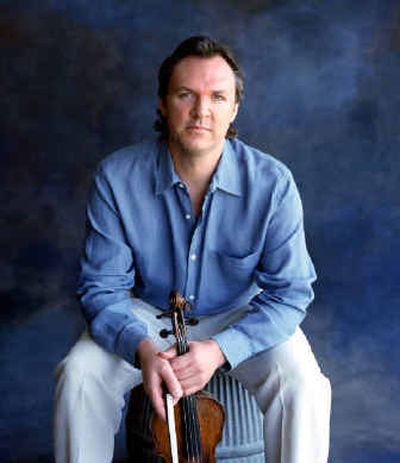Part fiddler, part composer

Those who know Mark O’Connor primarily as a fiddler might be startled by the names he invokes as his most important inspirations.
“Bernstein, Copland and Gershwin are the three biggest in the American field,” he said in a recent phone interview.
“A lot of my contemporaries, too: Wynton Marsalis and John Adams. And then I like the old masters. Beethoven is probably my very favorite.”
That’s because O’Connor has become one of the most prolific and respected composers in America. Ever since his “Fiddle Concerto” and “Appalachia Waltz” became classical-crossover hits in the mid-1990s, he has increasingly turned his energies to composing.
“I actually have six concertos now, and I can be playing any one of the six at any time during the year,” said O’Connor.
In his concert with the Spokane Symphony on Friday, he’ll play one of his most respected concertos, “Fanfare for the Volunteer.” He’ll be accompanied by the orchestra under the direction of associate conductor Morihiko Nakahara.
Other pieces on the program include “Threads and Strings,” “Song of the Liberty Bell” and “Call of the Mockingbird,” which are some of O’Connor’s best-known compositions for orchestra.
“It’s really very rewarding to (perform the concertos) because I worked so hard on these compositions,” he said. “Each one takes about nine months to compose.”
Meanwhile, he’s working on a number of commissions. He’s premiering a Double Concerto for Violin and Cello in May and a new string quartet piece in June.
He accomplishes all of this while keeping up a full performing schedule.
Besides solo concerts with orchestras, O’Connor also tours and records with two trios: The Appalachia Waltz Trio and the Hot Swing Trio.
The Appalachia Waltz Trio plays the music O’Connor wrote and/or arranged for his hit CDs “Appalachia Waltz” and “Appalachian Journey.” Since his original collaborators Yo-Yo Ma and Edgar Meyer are booked up with their own concert careers, O’Connor formed a trio with violist Carol Cook and cellist Natalie Haas to play this music live.
His latest CD, “Crossing Bridges,” is also an Appalachia Waltz Trio project.
The Hot Swing Trio was formed to play music from his two recent jazz CDs, “Hot Swing!” and “In Full Swing.”
Just about the only thing O’Connor doesn’t do these days is country-style fiddling. His days as a Nashville session man are long gone.
“As far as that genre, there’s not much for an instrumentalist to do in that world,” he said. “That’s why I made a departure from that scene.”
Yet that doesn’t mean he has abandoned his folk roots. In fact, they permeate even his most serious compositions.
“Everything I end up doing, I want to make sure I can bring in my folk element,” said O’Connor. “That’s sort of my signature. I just did a choral a cappella piece and you can definitely tell the folk music influence even in the vernacular of the choral writing.”
He has even been approached to write an opera and Broadway musical. And if those ever come to fruition, he says, they will be “folk-tinged no matter what.”
Spokane audiences might have a particular insight into O’Connor’s earliest folk roots, because he developed some of those roots right here when he was a teenager in the 1970s.
O’Connor, who grew up in Mountlake Terrace near Seattle, had some Spokane friends with a bluegrass band called Custer’s Grass Band.
“My mom would drive me across the mountains to play with them and we would spend a nice weekend with the bluegrass players,” said O’Connor. “We played quite a few places around Spokane, from pizza parlors to high school auditoriums.”
By the way, it’s fitting that O’Connor is performing the day after St. Patrick’s Day. He was just named one of the “Top 100 Irish” in America by Irish-American Magazine.